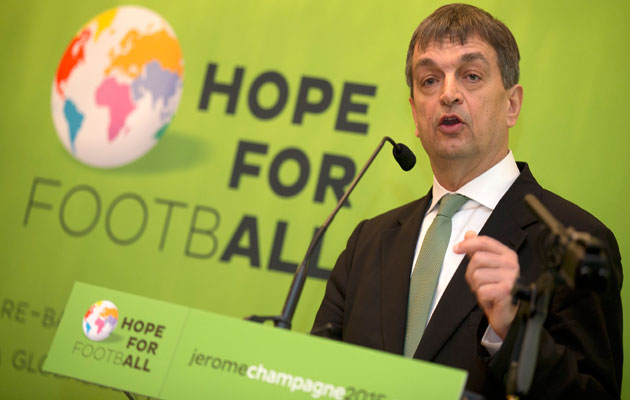Jerome Champagne’s FIFA fizz has evaporated. The Frenchman has quit the presidency trail, accusing federations and officials of running scared, after failing to secure the necessary support to enter the formal race.
The withdrawal of the former FIFA deputy general secretary has left three challengers to Sepp Blatter’s ambition for a fifth term in office: FIFA’s Asian vice-president Prince Ali of Jordan, Dutch federation chairman Michael Van Praag and Portugal’s former world player of the year Luis Figo.
New rules stipulate that a candidate needs written nominations from at least five of the world federation’s 209 member associations. Champagne said that, despite a year-long campaign, he had attracted only three.
Clearly he blamed European federation UEFA’s ‘multiball’ strategy of backing the other three candidates for eating away at his potential support.
He also regretted a fear factor among federations eager to remain in the good books with FIFA and their own regions.
Potential supporters turned away because:
“they feared reprisals from their confederations having issued ‘recommendations’;
” their federations were candidates to host continental competitions;
“they relied too heavily on the financial support;
“they were committed to defend a united continental front; and
“some of the presidents were themselves engaged in an election or simply preferred another candidate.”
Pointing a finger directly at UEFA, without naming it or its Qatar-supporting president Michel Platini, Champagne added: “The latest events orchestrated in secret with barely veiled intentions by one of [the confederations], distributing letters of support between candidates, made me lose sponsorships especially in Europe.”
Champagne said he did not “feel any bitterness” but that was hardly borne out by the derision he poured on “proxy candidates waging the battles that others did not have the courage to fight.”
Intriguingly, the one figure at whom he did not aim his rhetoric was his old boss for 11 years, Blatter.
Instead UEFA and its puppeteers were repeatedly painted as the villain of the piece.
Champagne raged on: “So-called programmes will appear with a list of high-sounding slogans and little precise substance.
“Proposals will be touted, smelling of demagoguery and politicking, such as increasing the number of teams in the finals of the World Cup – and certainly some ‘copy and paste’ sections directly from my programme.
“The hidden agenda – or not so hidden after all – is clear: under the guise of reforming FIFA lies the objective of further weakening it in favour of continental structures.
“This at a time when a strong governance of football, with regulatory and redistributive powers, is needed more than ever. It constitutes the perennial vision of UEFA since 1998.
“It is also to pave the road for the wealthy actors of the West European football to get their hands on the last thing they do not control yet: FIFA and the world government of football.
Blatter remains overwhelming favourite to hold off what Champagne regards as Europe’s ‘evil empire.’
Whether this will result in the reward of a return to FIFA for the Frenchman with an anti-European common interest will remain an open question until after FIFA Congress in Zurich on May 29.







